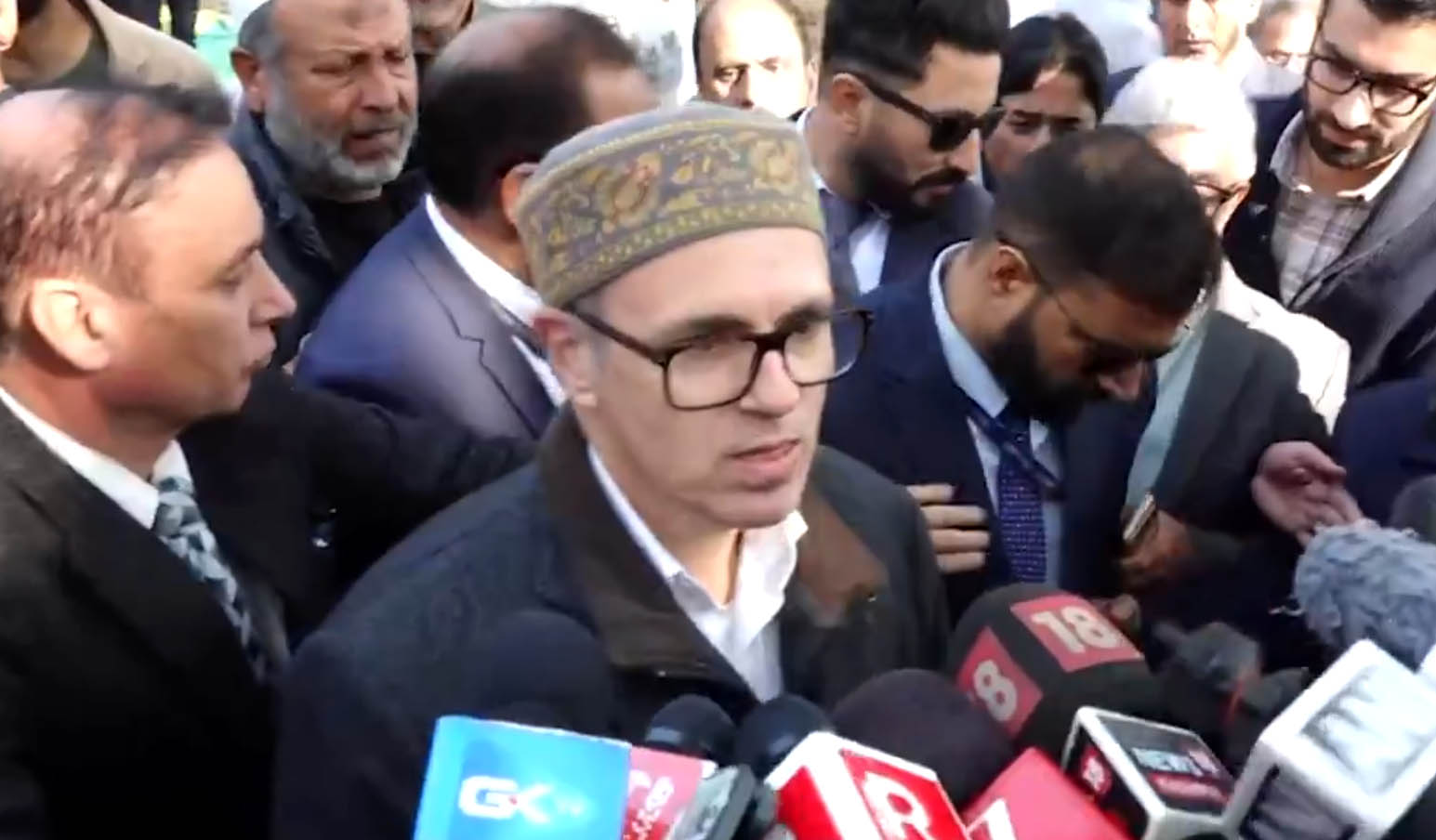Campaigning in Budgam, Omar Abdullah accuses PDP of betraying Kashmiri voters by aligning with BJP in 2015 — calling it the turning point that led to the erosion of Jammu and Kashmir’s autonomy and identity.
By: Javid Amin | 08 November 2025
In a fiery speech ahead of the Budgam bypolls, Jammu and Kashmir Chief Minister Omar Abdullah declared that the political destruction of Jammu and Kashmir began not in 2019 with the abrogation of Article 370, but in 2015, when the Peoples Democratic Party (PDP) formed a coalition government with the Bharatiya Janata Party (BJP).
“The destruction of Jammu and Kashmir began in 2015, not 2019,” Omar told the crowd, accusing the PDP of “betraying the people’s trust” and “handing over the keys of Kashmir’s autonomy to those who wanted to dismantle it.”
Omar Abdullah’s Accusations Against PDP
Omar reminded voters that the PDP, under late Mufti Mohammad Sayeed and later Mehbooba Mufti, had campaigned in 2014 on a promise to keep the BJP out of power. Yet, within months of the elections, the party entered into an alliance with the BJP, forming what was termed a “north-south experiment.”
“They asked people to vote for them to stop the BJP. But after elections, they went straight to Nagpur and Delhi to join them,” Omar said, referencing the PDP-BJP coalition agreement that became the foundation of the 2015 government.
He asserted that this decision paved the way for the BJP’s deep political and administrative penetration into Jammu and Kashmir, eventually enabling Delhi’s full control over the erstwhile state’s affairs.
2015: The Turning Point
According to Omar Abdullah, 2015 was the year Jammu and Kashmir lost its political balance.
He argued that the alliance not only compromised regional autonomy but also weakened public faith in the mainstream political structure.
“Once the PDP joined hands with the BJP, the door to New Delhi’s long-term plan opened wide. What happened in 2019 was only the final chapter of a story that began with that handshake in 2015,” Omar remarked.
The former Chief Minister accused the PDP-BJP coalition of surrendering on key constitutional and fiscal safeguards, particularly citing the introduction of the Goods and Services Tax (GST) in Jammu and Kashmir in 2017.
“GST was not a financial reform — it was a political tool of centralization. It made J&K’s economy an extension of Delhi’s, stripping our fiscal autonomy,” he said.
‘Betrayal of Mandate’ and the Road to 370’s Abrogation
Omar Abdullah linked the 2015 coalition directly to the 2019 abrogation of Article 370, arguing that the PDP’s decision to align with the BJP legitimized Delhi’s narrative of “integration through partnership.”
“They legitimized the BJP’s agenda under the guise of development and stability. The result was the death of our special status, our flag, and our constitution,” he asserted.
He also accused the PDP of silencing dissent within the administration during its rule, saying that “those who now talk about resistance were silent when BJP ministers were deciding Kashmir’s future inside the Secretariat.”
Budgam Bypoll Context: NC vs PDP
The remarks come amid an intense campaign for the Budgam Assembly bypoll, where the National Conference (NC) and PDP are both fielding candidates — turning it into a proxy battle of credibility between former coalition partners turned arch-rivals.
The contest is particularly symbolic, as Budgam holds historical importance as a Shia-majority political hub and is witnessing internal divisions within the Aga family, with members contesting from NC, PDP, and BJP respectively.
Omar positioned the NC as the only consistent force defending J&K’s constitutional identity since the abrogation of Article 370.
“Our party didn’t compromise for power. We have always stood with the people, not with Delhi’s dictates,” he said.
Political Reactions
The PDP dismissed Omar Abdullah’s remarks as “political opportunism”, accusing the NC of selective amnesia.
A PDP spokesperson said:
“It was the NC that partnered with the BJP at the Centre in earlier years and voted with them in Parliament on several occasions. They cannot wash away history.”
Meanwhile, BJP leaders responded by asserting that Omar Abdullah is “living in denial.”
“The truth is, both NC and PDP used Delhi’s power when it suited them. The BJP simply exposed their hypocrisy,” said a senior BJP functionary in Jammu.
A Familiar Political Battle Reignited
Omar Abdullah’s remarks signal the return of the PDP-BJP alliance debate as a major election issue in Jammu and Kashmir.
For many voters, 2015 remains a turning point that changed the trajectory of Kashmiri politics, leading to growing alienation, central intervention, and eventual statehood loss.
Analysts note that Omar’s framing — “2015, not 2019” — is a strategic reframing of political memory, aimed at holding PDP accountable for what he sees as the start of Kashmir’s systematic disempowerment.
“By shifting the blame from Delhi’s decision to local missteps, Omar is trying to reclaim moral authority in the Valley’s post-370 politics,” said political commentator Dr. Irfan Wani.
The Bigger Picture
The speech reflects an emerging narrative war between the NC and PDP, both struggling to redefine relevance in a landscape now dominated by BJP influence and Lieutenant Governor-led governance.
While the NC is emphasizing “consistent resistance”, the PDP seeks to project itself as the voice of reconciliation and grassroots empowerment.
For voters, however, both face a credibility test — one shaped by alliances of the past and promises of the future.




